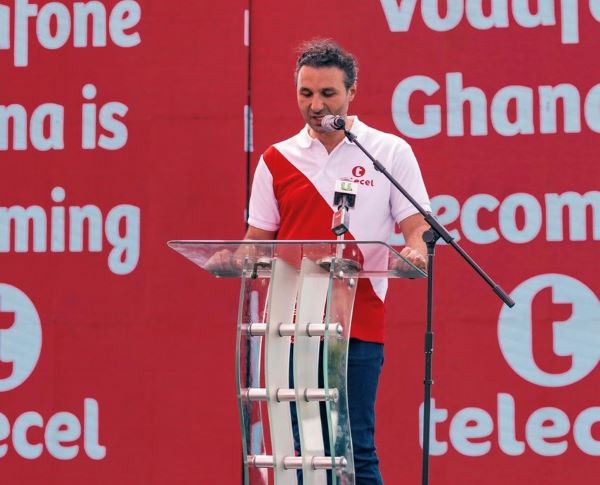
Telecel Group CEO Moh Damush has declared that the company’s target is to become a strong two in Ghana soon.
He was speaking to journalists at the public unveiling of the Telecel Ghana brand, which was part of a series of events rolled out over a three-day period to formally announce the rebranding of Vodafone Ghana to Telecel Ghana.
According to Moh Damush, Telecel Ghana is the flagship of the Telecel Group and they intend to keep it so, adding that the company will therefore sustain its interest and investment in Ghana to ensure that it rises to the top of the market.
Here are his exact word:
”We are dedicated to this country [because] the Ghana operation is our flagship and it will continue to be and that is why it will have our dedication and determination to succeed and make it a strong number two player in the country.”
Coming into Ghana, the Telecel Group was fully aware that there was dominant player called MTN, whose onslaught four other players – Airtel, Tigo, Glo and and global industry giant Vodafone has not been able to survive.
At least two of those players, Glo and Vodafone, when they first came into the market, declared their intentions to unseat the dominant player. But they eventually had to vacate the market, while the dominant kept growing to the point of being declared a significant market power.
It would therefore appear that the Telecel Group CEO has taken some history lessons from the Ghanaians telecoms market, and has deliberately decided to be measured in his comment about what market position he is aiming it.
Confident declaration
Moh Damush is quite confident about the prospects of Telecel Ghana, given the fact that, like MTN, Telecel is also an African and Africa-focused telco with a spirited dedication to investing heavily in Ghana as its flagship to deliver exciting innovations and great customer experience.
In keeping with its Africa-focused strategy, Telecel committed to invest some US$700 million in acquisitions and mergers on the continent.
In Ghana, Moh Damush said Telecel has, within just one year, rolled out 500 additional 4G sites in the country, which is the largest expansion in the history of the company, and has also increased retail shops from 30 to 150 within the same period, with a commitment to double the number over the next one year.
“I can assure you that this momentum in terms of investment will continue and even move faster in the coming year,” he stated.
Prior to the approval of the sale of Vodafone’s 70% shares to Telecel, the company assured Ghana government that it was ready to invest at least US$500 million in Ghana within the first three years.
One year is gone already and when asked about the numbers, Moh Damush said “the investment scale is still ongoing – we are still making massive investments in multi-million dollars and we will continue to investment as much as Telecel Ghana needs to become a big competitor in the Ghanaian market and to provide good quality of service for the customers.”
He is also on record as saying that Telecel Ghana will take full advantage of the various regulatory interventions such as national roaming, technology neutrality and even the coming tariff control by the National Communications Authority (NCA) to deliver great customer experience and remain a formidable competitor.
About Telecel
Telecel Group is an Africa-focused telecoms company founded in 1986 by the late Congolese businessman Miko Rwayitare. In 2017, Telecel was acquired by French Business tycoon Hugues Mulliez and his partners, Nicolas Bourg and Moh Damush, who is now the Group CEO. Telecel operates in more than 27 countries, including Gabon, Equatorial Guinea, the Central African Republic, the Democratic Republic of the Congo, Chad and now Ghana, with footprints in the UK and Spain and Gibraltar. The company’s main stay has been fintech, e-commerce, and tech startups. It has, for the past two to three years, been investing in growing tech start-ups across Africa through its accelerator program – Africa Start-up Initiative Program (ASIP).









